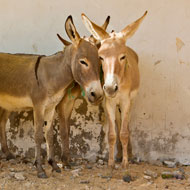
‘Ejiao’ industry turns to Africa’s working donkeys to meet demand
Growing demand for a traditional Chinese product is threatening the lives and welfare of millions of Africa’s donkeys, as well as the poor communities that depend on them, the charity SPANA has said.
The traditional Chinese product ‘ejiao’ is a gelatinous substance made by boiling the hides of donkeys. The ingredient is often included in luxury beauty products that sell for up to £300 per kilo in China.
With increasing affluence and an ageing population, demand for ejiao is blossoming, which has led to a dramatic fall in the country’s donkey population. Now, SPANA says manufacturers are looking to Africa to meet the demand for donkey skins.
In some countries, the price of donkey hide has risen eight or 10-fold in the past few years, meaning donkey ownership has become unaffordable for many. Such high prices are also driving crime, the charity says, and working animals are being stolen from some of the world’s poorest communities.
Donkeys are likely to face particularly barbaric treatment in the illegal trade and are often killed brutally and inhumanely.
SPANA’s chief executive Geoffrey Dennis is leading a campaign to stop the export of donkey skins.
“From Mali to Zimbabwe, I’ve seen the devastation caused by this brutal trade, which is destroying livelihoods, undermining communities and leading to the slaughter of countless animals that are often kept in hellish conditions.
“A billion of the world’s poorest people rely on working animals for their livelihoods - yet this trade, driven by luxury consumer demand, threatens to dramatically reduce or wipe out all donkeys in many communities across Africa within the next decade.”
A rising number of countries across Africa are banning the export of donkey products, but even where such bans do exist, the illicit trade often remains a major concern. SPANA is working with international and local NGOs to halt the ejiao trade while its impact is assessed. The charity is also working with governments to implement national bans on the export of donkey products.
Image © SPANA



 The latest
The latest